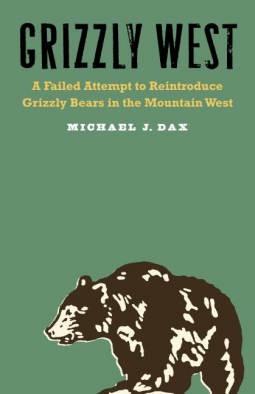
Grizzly West
A Failed Attempt to Reintroduce Grizzly Bears in the Mountain West
by Michael J Dax
This title was previously available on NetGalley and is now archived.
Send NetGalley books directly to your Kindle or Kindle app
1
To read on a Kindle or Kindle app, please add kindle@netgalley.com as an approved email address to receive files in your Amazon account. Click here for step-by-step instructions.
2
Also find your Kindle email address within your Amazon account, and enter it here.
Pub Date Aug 01 2015 | Archive Date May 20 2015
Description
Environmentalists and the timber industry do not often collaborate, but in the years immediately following gray wolf reintroduction in the interior American West, a plan to reintroduce grizzly bears to the Selway-Bitterroot Wilderness of Idaho and Montana brought these odd bedfellows together. The partnership won praise from diverse interests across the country and in 2000 the U.S. Fish and Wildlife Service approved a plan for reintroduction. When the Bush Administration took office, however, it promptly shelved the project.
In Grizzly West Michael J. Dax explores the political, cultural, and social forces at work in the West and around the country that gave rise to this innovative plan but also contributed to its downfall. Observers at the time blamed the project’s collapse on simple partisan politics, but Dax reveals how the American West’s changing culture and economy over the second half of the twentieth century dramatically affected this bold vision. He examines the growth of the New West’s political potency, while at the same time revealing the ways in which the Old West still holds a significant grip over the region’s politics. Grizzly West explores the great divide between the Old and the New West, one that has lasting consequences for the modern West and for our country's relationship with its wildlife.
Advance Praise
“Idaho’s Selway-Bitterroot Wilderness together with the Frank Church Wilderness constitute the largest roadless area in the lower 48. All this land is prime and historical grizzly bear habitat. Yet, despite nearby grizzly populations in Montana, this vast region is tragically and bafflingly devoid of grizzly bears. How could this be? Michael Dax’s unusually thorough book documents our public failure to reintroduce the great bear to its natural home.”—Doug Peacock, author of Grizzly Years and In the Shadow of the Sabertooth
“Michael Dax expertly probes the economic, cultural, and political divides spawned by recent efforts to reintroduce grizzly bears into the Bitterroot Range. . . . This is a first-rate environmental history that will enlighten environmentalists, legislators, natural resource users, and others engaged in deciding the fate of public lands in the modern American West.”—Mark Harvey, author of Wilderness Forever: Howard Zahniser and the Path to the Wilderness Act
“Michael Dax delivers a nuanced and compelling study of the interconnectedness of politics and the environment in the West. He ably tells a story that far too few know, and he does so with grace and clarity and skillfully avoids green-washing this topic.”—Sara Dant, professor of history at Weber State University and coauthor of the Encyclopedia of American National Parks
Available Editions
| EDITION | Hardcover |
| ISBN | 9780803266735 |
| PRICE | $37.50 (USD) |
Links
Average rating from 5 members
Featured Reviews
 Reviewer 254829
Reviewer 254829
The reintroduction of species to areas where they have become extinct is highly complex. Not only do considerations have to be given to the environment and the ecology balance, which may have changed significantly in the time since the species has not been present, but also the ever changing human presence and the associated political ramifications along with it. This is especially so for dangerous apex predators like wolves and bears, where their interactions and verifies are not immediately apparent. Each reintroduction into each area is unique, and may because a species may be successful in one area does not guarantee success in another, seemingly comparable area.
This book tackles all of the issues and follows the reintroduction of bears in a fascinating and well written book.
 Kel M, Media/Journalist
Kel M, Media/Journalist
They can’t come back again
Grizzly West: A Failed Attempt to Reintroduce Grizzly Bears in the Mountain West by Michael J. Dax (University of Nebraska Press, $37.50).
The grizzly bear—proud resident of California’s state flag, if not of the state itself—no longer exists in the wild where it once roamed freely.
A plan, approved by the Fish and Wildlife Service in 2000, would have returned the grizzly to the largest stretch of wilderness left without roads, the combined Selway-Bitterroot Wilderness and the Frank Church Wilderness, a patch that covers a good chunk of Idaho and a small chunk of Montana. The real twist? Timber companies were on board, too.
In Grizzly West: A Failed Attempt to Reintroduce Grizzly Bears in the Mountain West, Michael J. Dax examines what happened when the plan collapsed, and by talking to all the stakeholders, discovers that it was less about partisan politics (as you might expect, and as a number of outlets reported) and more about the changing nature of the West itself. A fascinating look at just how complicated issues of wildlife and conservation are out here, as well as the grip in which the West is held by its own mythology, Grizzly West makes clear that it’s very hard for a bear, or a wolf, or a river to just be what they are when politics, history and human nature are involved.





